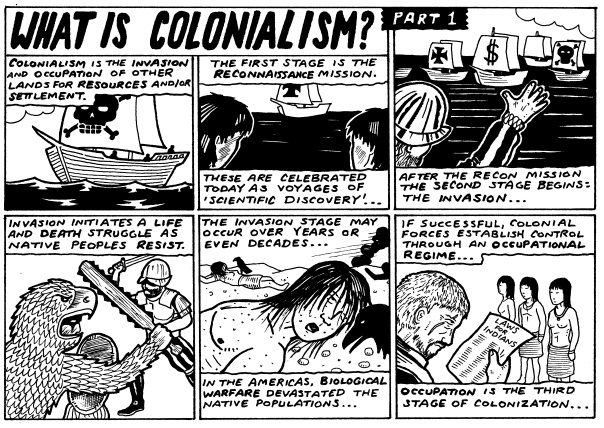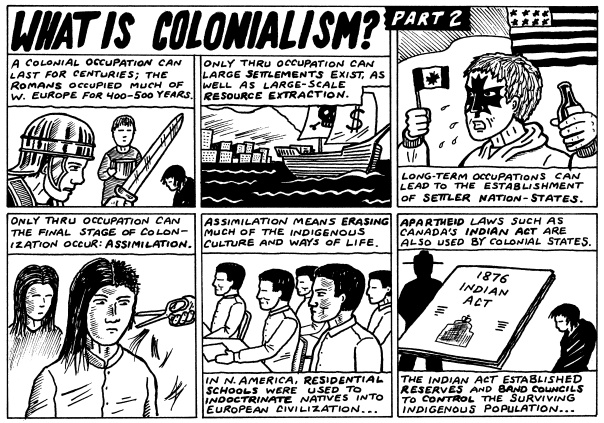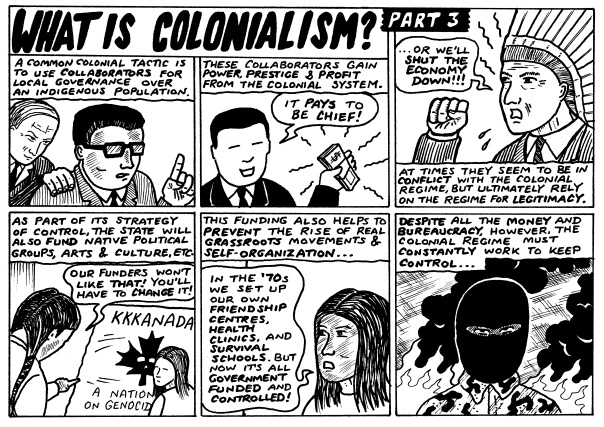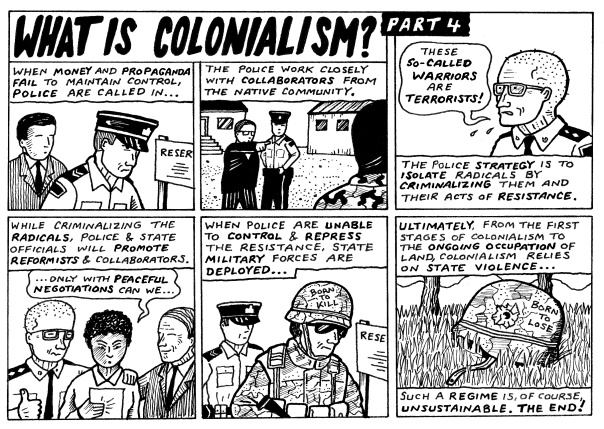Comic: What is Colonialism?
A four part comic by Zig Zag, originally published in Broken Pencil magazine.




Moderators: Elvis, DrVolin, Jeff




“The most potent weapon in the hands of the oppressor is the mind of the oppressed.”
—Steve Biko
In this volume, a number of new Indigenous scholars, writers, and activists have collaborated for the creation of a sequel to the Decolonization Handbook. The title, For Indigenous Minds Only, reflects an understanding that decolonizing actions must begin in the mind, and that creative, consistent, decolonized thinking shapes and empowers the brain, which in turn provides a major prime for positive change. Undoing the effects of colonialism and working toward decolonization requires each of us to consciously consider to what degree we have been affected by not only the physical aspects of colonization, but also the psychological, mental, and spiritual aspects. Kenyan intellectual Ngugi wa Thiong’o, in his book Decolonising the Mind, describes the “cultural bomb” as the greatest weapon unleashed by imperialism:
The effect of the cultural bomb is to annihilate a people’s belief in their names, in their languages, in their environment, in their heritage of struggle, in their unity, in their capacities and ultimately in themselves. It makes them see their past as one wasteland of non-achievement and it makes them want to distance themselves from that wasteland. It makes them want to identify with that which is furthest removed from themselves; for instance, with other peoples’ languages rather than their own. It makes them identify with that which is decadent and reactionary, all those forces that would stop their own springs of life. It even plants serious doubts about the moral righteousness of struggle. Possibilities of triumph or victory are seen as remote, ridiculous dreams. The intended results are despair, despondency and a collective death-wish.
The planting and igniting of this “cultural bomb” by the colonizing forces has been essential to the colonization process, for if our minds are contaminated with self-hatred and the belief that we are inferior to our colonizers, we will believe in both the necessity and virtue of our own colonization. We will begin to diminish the wisdom and beauty of Indigenous ways of being and embrace the ways of the colonizers as inherently superior. When we believe in their superiority, our motivation to fight for our own liberation is splintered and eventually seriously damaged. However, we do not believe that it can be killed. That destiny lies within each of us. Still, if we accept the cultural bomb, why would we fight for something we perceive to be undesirable?
Working toward decolonization, then, requires us to consciously and critically assess how our minds have been affected by the cultural bomb of colonization. Only then will we be positioned to take action that reflects a rejection of the programming of self-hatred with which we have been indoctrinated. We will also learn to assess the claims of colonizer society regarding its justification for colonization and its sense of superiority. When we regain a belief in the wisdom and beauty of our traditional ways of being and reject the colonial lies that have inundated us, we will release the pent-up dreams of liberation and again realize the need for resistance to colonization. This volume is dedicated to facilitating the critical thinking that will help us work toward our collective decolonization.
Definitions of Colonization and Decolonization
Colonization generally refers to the process that is perpetuated after the initial control over Indigenous Peoples is achieved through invasion and conquest. Perpetuating colonization allows the colonizers to maintain or expand their social, political, and economic power. It is detrimental to us because their power comes at the expense of Indigenous lands, resources, lives, and self-determination. Not only has colonization resulted in the loss of major rights such as land and self-determination, most of our contemporary daily struggles are also a direct consequence of colonization (poverty, family violence, chemical dependency, suicide, health deterioration). Colonization is an all-encompassing presence in our lives.
Decolonization is the meaningful and active resistance to the forces of colonialism that perpetuate the subjugation and/or exploitation of our minds, bodies, and lands. Its ultimate purpose is to overturn the colonial structure and realize Indigenous liberation. First and foremost, decolonization must occur in our own minds. The Tunisian decolonization activist, Albert Memmi, wrote, “In order for the colonizer to be the complete master, it is not enough for him to be so in actual fact, he must also believe in its legitimacy. In order for that legitimacy to be complete, it is not enough for the colonized to be a slave, he must also accept his role.” The first step toward decolonization, then, is to question the legitimacy of colonization. Once we recognize the truth of this injustice, we can think about ways to resist and challenge colonial institutions and ideologies. Thus, decolonization is not passive, but rather it requires something called praxis.
Brazilian libratory educator Paulo Freire defined praxis as “reflection and action upon the world in order to transform it.” This is the means by which we turn from subjugated human beings into liberated human beings. In accepting the premise of colonization and working toward decolonization, we are not relegating ourselves to a status as victim, but rather we are actively working toward our own freedom to transform our lives and the world around us. The project that begins with our minds, therefore, has revolutionary potential.



ultramegagenius » Wed Dec 24, 2014 3:45 pm wrote:There is nothing in the modern imperialist system that makes sense without reference to exopolitics. To infer that man could naturally be this cruel to man suggests that we do not deserve to live.

American Dream wrote:Whiteness is a socially constructed phenomenon rather than a case of inherent evil and it is the institutional factors that are most important in understanding what it means today.
Users browsing this forum: No registered users and 2 guests